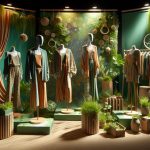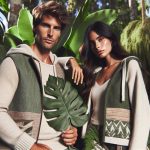Consider Patagonia, a brand known for its dedication to environmental sustainability through recycled materials and ethical production methods. You've likely noticed the growing appeal of eco-friendly fashion, but have you explored the range of brands that excel in this area? From sustainable streetwear to ethical luxury, there are numerous options that align with your values. Discover how you can make a positive impact on the planet while staying stylish. The next steps you take in updating your wardrobe could notably contribute to a greener future.
Table of Contents
Key Takeaways
- Prioritize brands using recycled fabrics and organic cotton for eco-conscious style.
- Follow brands with fair trade production ensuring fair treatment and living wages.
- Support labels using plant-based materials like bamboo and mushroom leather.
- Look for fashion brands promoting upcycled apparel and circular fashion economy.
- Choose brands committed to transparency and sustainable, low-impact production processes.
Sustainable Streetwear
Sustainable streetwear combines style with eco-conscious materials, making it easy to look good while helping the planet. If you're passionate about sustainable fashion and street culture, you'll find that embracing eco-conscious designs doesn't mean sacrificing the edgy, urban styles you love. Brands today are crafting garments that speak to both your sense of style and your environmental values.
To master the art of sustainable streetwear, focus on brands that prioritize recycled fabrics, organic cotton, and low-impact dyes. These materials aren't just buzzwords; they represent a commitment to reducing the fashion industry's carbon footprint. When you wear clothing that's been thoughtfully created, you're not only contributing to a more sustainable world but also setting trends within the street culture community.
Explore brands that blend sustainable fashion with urban styles seamlessly. Look for those that incorporate innovative materials while staying true to streetwear's roots. From graphic tees to statement hoodies, these pieces are designed to make a statement—both in style and sustainability.
Ethical Luxury
Ethical luxury marries high-end fashion with a commitment to fair trade and environmentally friendly practices. When you invest in ethical luxury, you're not just buying a beautiful item; you're supporting a movement towards more responsible consumption. These brands emphasize slow fashion, creating timeless pieces that are designed to last, minimizing waste and promoting sustainability.
Here's why ethical luxury matters and how you can embrace it:
- Fair Trade Production: Ethical luxury brands guarantee that everyone in their supply chain is treated fairly and paid a living wage. This means your purchase supports communities and artisans around the world.
- Sustainable Materials: These brands use eco-friendly materials like organic cotton, recycled fabrics, and responsibly sourced wool. Choosing such materials reduces the environmental footprint of your wardrobe.
- Quality Over Quantity: Slow fashion advocates for fewer, higher-quality pieces. Investing in well-made items means they last longer and stay out of landfills.
- Transparency: Ethical luxury brands are open about their processes. They'll show you where and how your clothes are made, ensuring you can make informed choices.
Vegan-Friendly Fashion
While investing in ethical luxury supports fair trade and sustainability, turning to vegan-friendly fashion guarantees that no animals are harmed in the making of your stylish wardrobe. You can embrace cruelty-free designs by choosing garments made from innovative plant-based materials like organic cotton, hemp, and bamboo. These fabrics not only offer a luxurious feel but also minimize your ecological footprint, blending style with responsibility.
Incorporate eco-conscious accessories into your collection, such as bags and shoes crafted from cork, mushroom leather, or recycled rubber. These animal-friendly trends stand out for their sustainable production processes and chic appeal. By selecting items made from these materials, you're supporting brands that prioritize the planet and animal welfare.
Stay updated on the latest vegan-friendly fashion innovations; many brands now offer entire collections dedicated to cruelty-free designs. This guarantees you have access to a wide range of options, from everyday wear to high-end fashion pieces. Elevate your wardrobe with these conscious choices and showcase your commitment to both ethical and eco-friendly living. Remember, every purchase you make can be a step towards a more humane and environmentally sustainable future.
Upcycled Apparel
Upcycled apparel transforms discarded materials into unique, stylish fashion pieces that reduce waste and promote creativity. By embracing upcycled fashion, you contribute to a sustainable future and support innovative design.
Many brands and designers use secondhand fashion and thrift store finds to craft their collections, making each piece a one-of-a-kind treasure.
Here's how you can get involved:
- DIY Upcycling Projects: Immerse yourself in the world of DIY upcycling projects. Transform old jeans into trendy shorts or repurpose a worn-out sweater into a chic scarf. The possibilities are endless, and you'll have a blast creating something uniquely yours.
- Creative Collaborations: Seek out brands that collaborate with artists and designers in creative partnerships. These collaborations often result in limited-edition pieces that blend various styles and materials, offering you exclusive items that stand out.
- Thrift Store Finds: Explore thrift stores for hidden gems. With a bit of imagination, you can turn secondhand fashion into something extraordinary. Plus, it's a budget-friendly way to refresh your wardrobe sustainably.
- Supporting Upcycled Brands: Many fashion brands specialize in upcycled apparel. By endorsing these brands, you're promoting a circular fashion economy and reducing textile waste. Look for labels that prioritize sustainability and craftsmanship.
Embrace upcycled apparel and make a stylish, eco-conscious statement!
Organic Basics
Embrace the purity of nature with organic basics that prioritize sustainability and comfort. When you choose these essentials, you're not just upgrading your wardrobe; you're making a commitment to the planet and its people.
Organic basics are crafted from biodegradable fabrics, assuring that your clothing doesn't contribute to landfill waste. Think of materials like organic cotton, Tencel, and hemp—each one providing a luxurious feel without the environmental toll.
When it comes to fair trade, organic basics stand out. Brands committed to this principle guarantee that every individual in the supply chain is treated with dignity and paid fairly. This ethical approach doesn't just benefit workers; it adds value to your purchases, knowing they come from a place of respect and equity.
Imagine slipping into a soft, organic cotton tee that's gentle on your skin and the earth. Or, consider the peace of mind that comes from knowing your comfy leggings are made with materials that will naturally decompose.
Frequently Asked Questions
How Can I Verify a Brand's Sustainability Claims?
You can confirm a brand's sustainability claims by detecting greenwashing, checking for sustainability certifications, and evaluating brand transparency. Confirm they practice ethical sourcing and provide clear, honest information about their environmental and social impact.
What Are the Best Materials for Eco-Friendly Fashion?
You should prioritize sustainable textiles like organic cotton and recycled polyester. Biodegradable materials such as hemp and Tencel are also excellent choices. These options guarantee your wardrobe is eco-friendly and minimizes environmental impact.
How Does Eco-Friendly Fashion Impact Pricing?
Oh, you thought sustainable practices would make fashion cheaper? Think again! Market demand and production costs skyrocket, but hey, at least your eco-friendly wardrobe will impress your friends and elevate your consumer perception.
Are Eco-Friendly Fashion Brands Size-Inclusive?
You'll find that inclusivity challenges persist, even with sustainability standards in place. While the fashion industry slowly improves size representation, eco-friendly brands still struggle to fully embrace inclusivity, balancing ethical production with diverse sizing options.
How Can Consumers Support Eco-Friendly Fashion Movements?
You can support eco-friendly fashion movements by prioritizing sustainable shopping and ethical consumption. Choose brands committed to sustainability, purchase fewer but higher-quality items, and stay informed about the environmental impact of your fashion choices.
- Tetron Fabric for Marine Applications: Durability and Use Cases - June 18, 2025
- Tetron Fabric for Outdoor Furniture: Weather Resistance and Care - June 18, 2025
- Tetron Fabric for Wall Coverings: Style and Application Tips - June 18, 2025






